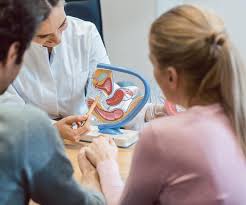
If the couple does not have a child for 1 year despite having regular and unprotected intercourse, the treatment method used to help the family have a child. infertility infertility treatment It is called. This situation is limited to 6 months for those over 35 years of age.
What is Infertility?
What are the symptoms of infertility?
The most common symptoms of infertility can be listed as follows:
- Irregular or no menstrual periods,
- Severe pain and discomfort during menstrual periods
- Heavy bleeding during menstruation
- Milk coming from breasts when not pregnant
- excessive weight gain,
- Excessive hair growth and acne problems related to hormonal disorders
- Problems with erection and ejaculation in men
- Pain and swelling in the testicles
- Men may experience symptoms such as decreased semen production. In addition, as age progresses, the efficiency of the reproductive organs decreases.
Factors That May Cause Infertility
Infertility may occur due to many different reasons such as sexual dysfunction. A full system examination and control is required to detect infertility. Patients are questioned and examined in detail by the doctor. It is recommended that couples without children go to the doctor together. Infertility is examined differently in men and women. Men first undergo a physical examination. The penis and testicles are examined in detail.
It is checked for varicocele and gynecomastia, that is, enlargement of the breasts. After 3-5 days of sexual abstinence, the sperm is taken into a container and examined in detail. The person should not ejaculate, masturbate or have sexual intercourse for a while before this test. The status of women's reproductive organs and hormones is evaluated. In order for women to become pregnant, the endocrine glands, the hypothalamus and pituitary glands, must function properly. These glands are located in the brain. The endocrine glands and reproductive system must work in harmony and health.
Factors that cause infertility in men can be listed as follows:
- Low sperm count,
- Sperm morphological defects occur,
- Sperms are immobile or move slowly,
- Low sperm concentration,
- sexual dysfunctions,
- azoospermia,
- varicocele,
- Excessive smoking and alcohol consumption,
- drug use,
- Stress,
- diabetes disease,
- Obesity,
- hormone disorders,
-
Having infectious diseases in the womb or during childhood.
Factors that cause infertility in men and women can be listed as follows:
- Low egg reserve,
- uterine tubes are closed,
- Ovulation disorder,
- Polycystic ovary syndrome,
- Chocolate cysts formed in the ovaries (endometriosis),
- Irregular menstrual cycle
- Obesity
- thyroid problems,
- High prolactin level,
- Problems caused by the immune system
- Large-scale myomas that develop into the uterus,
- Heavy smoking and alcohol consumption,
- The chances of fertility decrease with increasing age,
- early menopause
- Cancers occurring near the genital area and drugs used for the treatment of these cancers.
What to Look for in Couples Who Will Receive Infertility Treatment?
- Presence of eggs and ovulation: It is generally said that women with regular menstrual periods ovulate.
-
For pregnancy to occur, the number and shape of sperm must be sufficient.
- There is no defect or blockage in the path that allows the egg and sperm to unite.
How to Diagnose Infertility?

Infertility Infertility Treatment Methods
While many different factors can cause infertility, there are also several types of treatment methods. After determining the cause and type of infertility, in vitro fertilization treatment, which is one of the assisted reproductive treatment methods, is recommended for the couple. In this type of treatment, fertilization is achieved by combining the sperm taken from the father with the egg, which is the mother's reproductive cell, in a laboratory environment. After the embryo is formed, it is deposited into the mother's uterus to ensure pregnancy. Infertility infertility treatment Some of the frequently applied methods are as follows:
- Vaccination
-
egg rejuvenation
- In vitro fertilization treatment
- microinjection
- egg freezing
- embryo shaving
- auxiliary budding
- Mitochondria transfer
Infertility Infertility Treatment
The method to be followed in people diagnosed with infertility varies depending on the cause of infertility and whether there is sperm in the semen. for men infertility infertility treatment We can list the methods that can be applied as follows:
- Infertility drug treatment
- Infertility needle treatment
- Infertility vaccination method
- Assisted reproductive techniques
Drug Treatment for Male Infertility
In cases where infertility is caused by hormonal disorders, drug treatment is used. When the hormones that control sperm production decrease, replacing the hormones contributes to sperm production again. In this condition, called hypogonadotropic hypogonadism, sperm can be recovered after drug treatment that can last up to two years; In this way, it is possible to become pregnant with normal treatment or in vitro fertilization treatment.
Needle Treatment for Male Infertility
One of the methods for male infertility patients who can be treated with medication is oleaster treatment. It is very important to be patient as needle treatment can take an average of 1-2 years.
Vaccination Treatment (Insemination)
- Having morphologically normal and motile sperm in men.
- Ovulation and egg quality in women are at normal levels.
- There is no obstruction in the woman.
Is Infertility Treatment a Difficult Treatment?

Infertility infertility treatment It has become easier today. In the past, egg collection was done laparoscopically (a surgical method performed through a small hole in the abdomen). Patients are very uncomfortable with this technique. However, today it is performed with enhanced transvaginal ultrasound under general anesthesia or with superficial anesthesia, thus
The patient can return home 2 hours after egg collection. At the same time, the development of drug technology, easy use of drugs, less pain in the injection area and minimal reactions have made this treatment easier.
Frequently Asked Questions About Infertility Infertility Treatment
1-How Does Infertility Affect Women?
Infertility can be seen as an obstacle for women to become mothers. It can also be seen as changes in self-perception, such as infertility, loss of children, loss of control, loss of femininity, loss of physical health and functionality, loss of status, loss of imagination, loss of self-confidence.
2-What are Infertility Problems?
3-What are the Types of Infertility?
- primer Kısırlık: Daha önce hamile kalmamış kadınlarda görülen kısırlık türüdür. Kısırlıktan muzdarip çiftlerin yaklaşık %40’ını oluşturur.
- Secondary Infertility: This is the type of infertility seen in women who have been pregnant before.
4-How Long Does Infertility Treatment Last?
While infertility treatment lasts a month in some cases, the treatment process may take up to 6 months depending on some underlying reasons. When treatment methods such as vaccination or timed sexual intercourse are applied, the procedure can be completed in a shorter time.
5-How to Understand Female Infertility?
The simplest symptom of infertility in women of childbearing age is irregular menstrual bleeding. For example, if the period between two menstrual cycles is shorter than 21 days or longer than 35 days, this can be considered a symptom of irregular ovulation, which leads to infertility.



